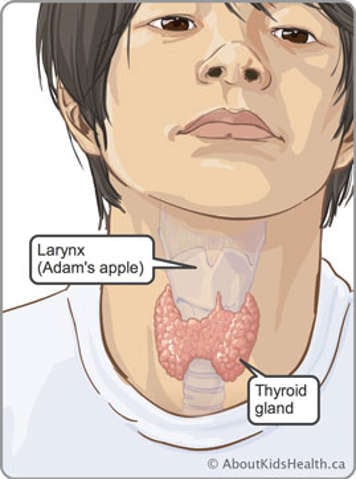What is thyroid cancer?

Thyroid cancer is a cancer in your thyroid gland. Your thyroid gland is in the front of your neck and is shaped like a butterfly. Your thyroid gland makes hormones. These are chemicals that travel through your blood to other parts of your body and control other cells and organs.
The hormones from your thyroid gland control:
- your growth and how you develop
- your metabolism (how fast or slow the cells in your body work)
The most common type of thyroid cancer in teens is called papillary thyroid cancer, which grows very slowly. Remember, a tumour grows from a mutation in a cell that causes the cell to divide out of control. The tumour is the mass of cells that is eventually formed.
Usually, the first sign of thyroid cancer is a lump or swelling in the neck that slowly gets bigger. There is usually no pain.
How is thyroid cancer diagnosed?
Doctors learn what type of thyroid cancer you have through a process called diagnosis.
Usually diagnosis of thyroid cancer starts with a doctor examining you and asking you a lot of questions about how you are feeling and why you came to the clinic or the hospital. They will then do blood tests and an ultrasound scan of your neck. The doctor will do a biopsy where they will take a sample of part of the tumour and check for cancerous cells under a microscope. They may also do more scans to get a picture of the inside of your body. These can help the doctor see how big the tumour is and if the cancer has spread.
How is thyroid cancer treated?
Doctors use the information they gather to plan your treatment. Your treatment will depend on:
- the type of thyroid cancer you have
- its stage (whether it has spread outside of the thyroid gland)
- the size of your tumour
Usually treatment for thyroid cancer includes surgery to remove the tumour, specialized treatment with radioactive iodine and hormone therapy if your entire thyroid gland has been removed by surgery. No chemotherapy in given to treat thyroid cancer. Radiation treatment is used only very rarely. The treatment is optional and is carried out by a doctor who specializes in treating the thyroid, called an endocrinologist, rather than an oncologist (doctor specialized in treating cancer).
Prognosis for thyroid cancer
Your doctor will probably talk to you and your family about the prognosis for your thyroid cancer. A prognosis means the likelihood or chance that treatment will work and that you will get better from cancer. Like your treatment, your prognosis will depend on where the tumour is located, the size of the tumour and whether it has spread.
The best source of information about your cancer is your health-care team. If you have any questions or there is anything you do not understand about your cancer, ask your doctors and nurses. They want to help you understand your cancer.
If you are nervous about asking the doctors or nurses yourself, you can talk to your parents/caregiver. They may be able to answer your questions or can help you ask questions when talking to the health-care team.






